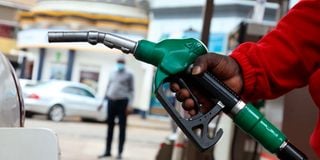Premium
Tough times as State sticks to fuel subsidy

A fuel attendant holding a fuel pump at the filling station along Kimathi Street. The government on Tuesday increased the subsidy on kerosene by Sh4.08 from Sh19.41 per litre to Sh23.49 to cushion consumers from high fuel prices despite calls by the International Monetary Fund (IMF) to end the scheme.
The government on Tuesday increased the subsidy on kerosene by Sh4.08 from Sh19.41 per litre to Sh23.49 to cushion consumers from high fuel prices despite calls by the International Monetary Fund (IMF) to end the scheme.
Kenyans consumed an average of 69,872,790 litres of kerosene monthly in the 2021/22 financial year, according to data from the Energy and Petroleum Regulatory Authority (Epra).
This means the National Treasury will spend about Sh1.64 billion to subsidise the product in the March 15 to April 14 pricing cycle.
The IMF has been pushing for the end of the subsidy as part of measures to cut public spending, which saw the Treasury promise to fully withdraw the subsidy by the end of December last year.
Found it hard
“The government will eliminate the remaining unsustainable and consumption-driven fuel subsidy by end of December 2022, but will continue to offer support to agricultural production through the fertiliser subsidy programme,” Treasury Cabinet Secretary Njuguna Ndung’u told the IMF.
The government has, however, found it hard to cut the subsidy at a time when the cost of living remains high.
In the latest monthly review, Epra has increased the subsidy on kerosene but cross-subsidised the price of petrol with that of diesel.
Motorists are paying an extra Sh9.01 per litre of petrol to subsidise diesel prices.
This arrangement comes at a time when the landed cost of fuel has continued to drop in recent months but a weak shilling has denied consumers lower fuel prices. Epra raised the price of the commodity by Sh2 per litre in the latest monthly pricing cycle that will last until May 14.
This marked the first time Epra has adjusted the cost of petrol in four months.
The agency last adjusted petrol prices in November last year when it cut the price by Sh1 per litre. The latest review means motorists are now paying Sh179.3 per litre of petrol in Nairobi.
Epra, however, retained prices for diesel and kerosene, which will see the cost of the two fuel products continue to retail at Sh162 and S145.94 per litre respectively.





